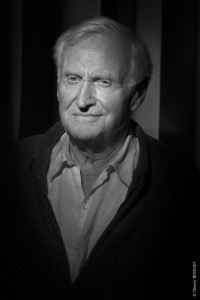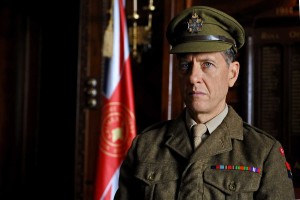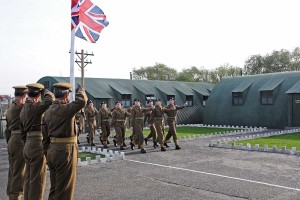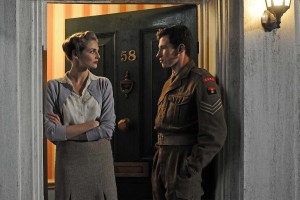![]()

Since all of the events and characters in Queen and Country are based on actual people, Boorman’s lawyers raised serious concerns about the project, creating delays in the project. “Sgt. Major Bradley [played by David Thewlis] might well sue us,” said Boorman of the decades which have passed since he first wanted to make Queen and Country. “Since he was 10-15 years older than me at the time, he would be 95 [now], so we’re safe.”
Revisiting the era was a natural progression for Boorman whose directing career spans over 50 years. “Looking back, historically, I started to think about that period and how what a point of change it was, five-six years after the war,” he said. “England was a very bleak place: rationing food and clothes. It was a few years after that, everything changed. The younger ones could see that everything was going to be different. [Britain had] the biggest empire in the history of the world – two-fifths of the earth surface were British. In the matter of a few years, it was all gone. It was a turning point, so I wanted to make a little record of that.”

Of the early 1950s setting of the film, Boorman reflected upon the political firestorm of the time. “The Cold War was very cold at that time,” he explained. “At the end of the film when Bill [Rohan, the lead character] goes to the hospital and he sees these young soldiers wounded from the Korean War, it all comes rushing through to him. They look like children – 18-20-year-olds fight wars. The way to end wars is that only men over 40 can fight.”
As with the Rohan character of the film, Boorman himself was engrossed in cinema, living close to an English studio during his younger days. “I was living the life of watching movies, and I wanted to be involved,” he remembered. “I applied to all of the studios including Shepperton as a clapper/loader. That was the absolute height of ambition. If I can spend my life as a clapper/loader, I would be completely fulfilled. I became a director instead.”
Born in 1933, Boorman experienced World War II as a youngster but came of age in the aftermath. “Like the vast majority of boys my age, I left school at 16,” he conveyed. “At 18, I had to go into the army. When I came out, I got a job as a trainee film editor. To be a film editor, I was on cloud nine. I started cutting documentaries, and I got asked to direct some of them, and then I thought directing documentaries was even greater. Eventually I got frustrated, and, before long, I was making dramas for the BBC. I never started out to be a film director, but one thing led to another.”

A lesser known story about Boorman’s career was that, in 1991, British director David Lean was trying to make Joseph Conrad’s 1904 novel Nostromo into a film and wanted Boorman to be a standby director as Lean was ill at the time. “He said, ‘I hope I get well enough to make this movie because I’m just beginning to get the hang of it,’” Boorman recalled. “It takes a long time to gain a complete knowledge and grasp of the craft. A lot of first films fail. When you are young and ignorant, you can blunder into something wonderful. As you get older, you become more careful and cautious. In the later period, when you grasp everything that’s involved, you can do anything because you know you can cope.” Of note, Lean died just before principal photography on Nostromo was set to begin and the film was never made.
When asked about his favorite of his own films, Boorman cited Excalibur being a project on which “I had a grasp of everything. Everyone who was involved in that film, we had a special bond. A lot of actors, it was their first film. I set out to make a film covering the whole spectrum of the story. I wanted to go from the very beginning – the birth of Arthur – right through to the quest for the grail. It was very ambitious. It almost escaped my control on a number of occasions – too ambitious. I think Excalibur is a film that I wanted to make very much for years and years, and I’m very happy to have done that.”
Six years after Excalibur, Boorman scored another unquestionable cinematic triumph with the aforementioned Hope and Glory, during which he already had in mind to do what became Queen and Country. “I wanted to do the story of my mother and three sisters,” he said. “Obviously, the autobiographical films I have great affection for. My grandfather – when the zeppelins came over in the first world war, dropping bombs, he bought a bungalow on the Thames; my mother spent her childhood there. She fled and brought her children to the same place. I wanted to do their story.”
 As with Queen and Country and lighting cameraman Seamus Deasy, Boorman professed that much of his success is due to collaboration with his panoply of key crewmembers. “I’ve had the privilege of working with great cinematographers,” Boorman detailed. “A cinematographer is only as good as what you put in front of him. I spent a lot of time in preproduction with the cameraman controlling how it’s going to look. One of the marks of a good film is when you get a sense of everything in the film is intended — no essentials have been removed. You know in ten minutes when you are dealing with a director who has control of the picture. There is no room for extraneous material. You have to pare it down. Everything is stripped out and only the essence is left.”
As with Queen and Country and lighting cameraman Seamus Deasy, Boorman professed that much of his success is due to collaboration with his panoply of key crewmembers. “I’ve had the privilege of working with great cinematographers,” Boorman detailed. “A cinematographer is only as good as what you put in front of him. I spent a lot of time in preproduction with the cameraman controlling how it’s going to look. One of the marks of a good film is when you get a sense of everything in the film is intended — no essentials have been removed. You know in ten minutes when you are dealing with a director who has control of the picture. There is no room for extraneous material. You have to pare it down. Everything is stripped out and only the essence is left.”
Despite his being a classic celluloid artisan, Boorman chose to shoot Queen and Country digitally. “The whole argument about film and digital is over,” he said. “Most projection is digital. Your films ends up on digital. When I was preparing this film, I went out and I shot with the camera that I eventually used – the Arriflex Digital camera. I shot with a film camera next to it in various lighting situations — almost nobody could tell which was film and which was digital. I couldn’t wait to get rid of film. It’s caused me so much pain in my life. I’d bribe the lab technician to put my rushes on first. If you go on last, the bath is getting dirty and they lose shots. I’m always having these arguments with the defenders of film. Little by little, those voices are getting weaker. Film was a 19th century invention.”
In addition to a late 1990s unfulfilled project, Boorman noted others he might do, the only enemy being time. “I worked on Narnia for a long time,” he said of his intended followup to 1999’s Martin Cahill biopic, The General. “I’ve got two-to-three scripts that I would like to have made, but I probably won’t be able to do them. Most people in most professions retire at the age of 65. Clint Eastwood is three years older than me, and he’s still going on. There’s a Portuguese director who’s 104, and he’s still working. I might do another one.”





